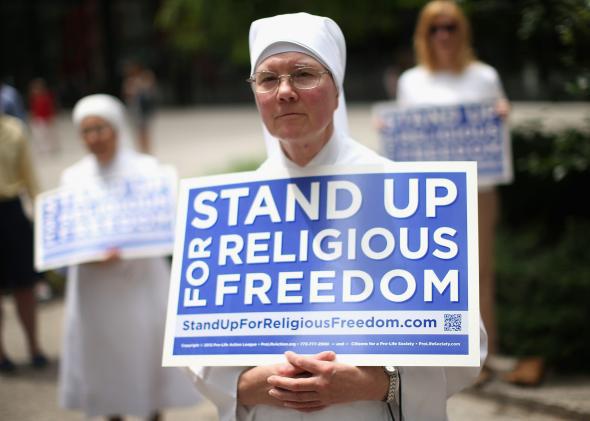Richard Epstein is a beloved theorist among libertarian conservatives, an advocate for the complete dismantlement of virtually every progressive reform and New Deal program of the last century. On Monday, Epstein also cast his lot with the social conservatives who have decided that marriage equality presents a dire threat to their religious liberty. His criticism of the Supreme Court’s decision in Obergefell v. Hodges is meant to be a smoke signal to social and libertarian conservatives that they must join forces to combat gay persecution of Christians. It is an absolute embarrassment, an unintelligible, inaccurate broadside that tries—and fails—to pass off intolerant hand-waving as serious intellectual concern.
Epstein begins by disputing the legitimacy of Obergefell, claiming that same-sex relationships “undercut” the “social imperative” to have children. He states that “historically,” government prohibition of same-sex conduct has “found a constitutional home.” These allegedly “ancient roots” of anti-gay sodomy bans, Epstein says, form the basis of Bowers v. Hardwick—“whose historical accuracy remains unquestioned.”
Unquestioned? It has been debunked. The notion that anti-gay sodomy laws are deeply rooted in American legal history is demonstrably false. As the famed historians’ brief in Lawrence v. Texas explained, the very phrase “homosexual sodomy” would have been “figuratively incomprehensible to the Framers of the Constitution.” The concept of homosexuality as “a discrete psychological condition and source of personal identity,” in fact, is a modern invention, dating only to the late 19th century—after the passage of the Bill of Rights and the 14th Amendment. Bowers’ stab at historiography is both anachronistic and wrong. As Kristin Eliasberg explained in Slate in 2003:
[T]he persecution that characterizes 20th-century treatment of homosexuals looks more like an anomaly and less like an ages-old patriotic tradition. To discriminate against a certain group, you must be able to identify it and have a reason to fear or dislike it. … [D]iscrimination on the basis of sexual orientation only “began” in the early 20th century when homosexuality was defined as a malformation of sexual identity. Suspicion, paranoia, and demonizing followed, culminating in the almost obsessive government-led persecution of the post-World War II era.
Admittedly, many states did proscribe fornication, sodomy, and adultery in the 18th and 19th centuries. But again, Bowers’ understanding of these laws was profoundly flawed. As both the ACLU and Cato Institute’s Lawrence friend of the court briefs prove, the “primary purpose” of sodomy laws was the “protection of children, women, and weaker men against sexual assault.” They were designed to bar “nonconsensual sexual activity.” In fact, sodomy laws “created an immunity for sodomy within the home between two consenting adults.” And when the laws were expanded in the late 18th century, they were beefed up in order to “protect children against sexual molestation and predation.”
Justice Anthony Kennedy himself refers to these “fundamental criticisms” of Bowers’ “historical premises” in Lawrence. Yet Epstein calls Bowers’ history “unquestioned.” That should be the reader’s first indication that this formerly esteemed professor’s analysis is utterly misguided.
Consider next Epstein’s attempts to prove that his fears of impending Christian persecution are “not idle speculation.” His main “data poin[t]” is the Supreme Court’s decision in Martinez v. Christian Legal Society. Here is Epstein’s summary of the case:
[A] five-to-four majority with Justice Kennedy concurring, held that it was perfectly proper for Hastings Law School, a public institution, to deny the tiny Christian Legal Foundation the full benefit of school facilities largely because of its opposition to same-sex marriage. The government can offer its subsidies to some groups but not to others, and in so doing, force small isolated groups to subsidize powerful gay rights organizations. Religious intolerance best describes that outcome.
This summary is, quite simply, false. Here are the actual facts of the case. Hastings—a public law school funded with taxpayer money—informed CLS that, in order to receive school funding, it “must open its membership to all students irrespective of their religious beliefs or sexual orientation.” (That policy applied to every club on campus.) CLS declared that it would refuse to grant membership to students who partake in “unrepentant homosexual conduct.” Because CLS insisted on discriminating against gay students, Hastings declined to fund it. However, the school allowed the club to operate freely, even giving access to chalkboards and campus bulletin boards to advertise its events.
Epstein says Hastings denied CLS funding “largely because of its opposition to same-sex marriage.” That is erroneous. Hasting denied CLS funding explicitly because the club demanded a special right to discriminate against gay students. Epstein states that “[r]eligious intolerance best describes that outcome.” I suspect that another kind of intolerance best describes Epstein’s butchering of the truth.
Conservatives like Epstein would like to argue that the extension of anti-discrimination laws to LGBTQ people somehow constitutes anti-Christian persecution. Never mind that these laws have, in many states, been expanded to cover sex, creed, national origin, ancestry, disability, political affiliation, marital status, and smoker status without widespread outcry. Suddenly, the LGBTQ community’s request for freedom from discrimination has been rebranded by the right as anti-Christian persecution.
With this inane critique, Epstein has publicly sided with the social conservatives who think LGBTQ rights are a threat to their purported “religious liberty” to discriminate. Epstein says he “fear[s] the totalitarian overtones sounding from the next round of gay rights initiatives.” His critique makes me fear that in their rush to support anti-gay discrimination, theorists like Epstein will abandon accuracy and honesty for embarrassing hokum like this.
Want to hang out with Outward? If you’ll be in or near New York City on Monday, July 13, join June Thomas, J. Bryan Lowder, and Mark Joseph Stern—and special guests Ted Allen, of Queer Eye and Chopped fame, and marriage-equality campaigner extraordinaire Evan Wolfson—for a queer kiki at an Outward LIVE show, hosted by City Winery. Details and tickets can be found here.
